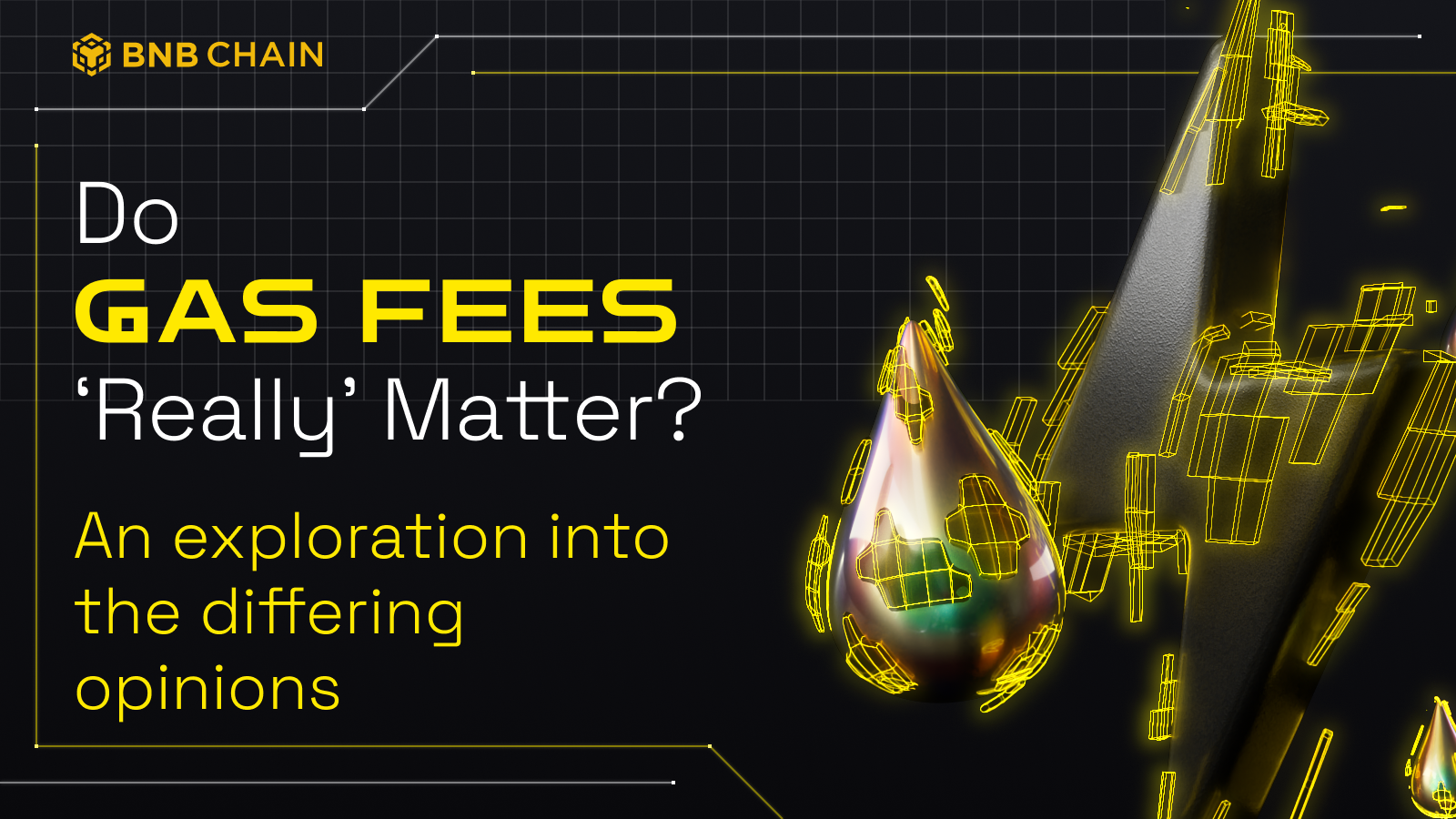Chains
BNB Beacon Chain
BNB ecosystem’s staking & governance layer
Developers
Solutions
Tokenization
Get Your Business Into Web3
Ecosystem
Community
Do Gas Fees ‘Really’ Matter?

In the fast-paced, whirlwind world of cryptocurrency, a recurring topic that fascinates and baffles new and veteran market participants alike is the enigmatic concept of gas fees. These fees can be high and volatile. Its frequent discussion led to the Layer 2 (L2) solutions that tackles the issue of transaction costs.
As we see a rise in the adoption of L2 solutions, it’s worth exploring the differing opinions around gas fees and why it still matters for some.
What are Gas Fees?
Before we dive into the heart of the matter, it is essential to clarify what gas fees are. Broadly, gas refers to the computational power needed to execute a particular transaction or contract on the network. This computational power is not free; hence we have "gas fees". These fees are paid to network validators, who validate and record transactions on the blockchain.
Gas fees play a crucial role in maintaining the integrity of blockchain networks. First, they act as an incentive for validators to accurately process transactions and keep the network secure. Without this incentive, validators do not have an economic reason to lend their computational power to the network.
Second, gas fees help prevent network spamming. If transactions were free or extremely cheap, bad actors could flood the network with meaningless transactions, causing unnecessary congestion and potentially grinding the network to a halt.
While gas fees can technically be categorized as "network fees", they are not synonymous in most blockchain-related discussions. Network fees usually refer to transaction costs on non-smart contract blockchains like Bitcoin. These fees compensate miners for securing the blockchain, similar to gas fees. However, they are not associated with executing smart contracts or Web3 dApps, unlike gas fees.
What Happens When Gas Fees are High?
When gas fees are high, it can have several impacts on users. For one, high fees can render certain types of transactions economically unfeasible. For instance, if the gas fee is higher than the amount a user intends to send, the transaction makes no economic sense.
High gas fees can also lead to transaction delays. Users can set the gas price they are willing to pay for a transaction. If the network is congested and gas prices are high, those offering lower gas fees may have to wait longer for their transactions to be processed. This can be particularly problematic for time-sensitive transactions.
However, there are also cases when users ignore high gas fees.
Despite the negative impacts, there are cases when users are willing to ignore high gas fees. For instance, during periods of high market volatility, users may be willing to pay higher gas fees to ensure their transactions are processed promptly. The potential profits or losses during these periods often dwarf the cost of gas fees.
Additionally, certain Decentralized Finance (DeFi) activities, such as yield farming or participating in liquidity pools, can generate returns that justify paying high gas fees. Similarly, minting or trading high-value NFTs (Non-Fungible Tokens) can make high gas fees seem insignificant at times.
Avi Felman, head of digital asset trading at GoldenTree Asset Management once compared this willingness to pay high gas fees on Ethereum to the appeal of living in New York when speaking to Blockworks on the 1000x podcast: “Yes, Manhattan’s expensive, but it’s expensive for a reason — because everybody’s there, and everybody that you want to be around is already there.”
His description summarized the phenomenon witnessed with April's PEPE trading craze that led to the surge in Ethereum’s gas price. The highest gas price was on May 5, when the average hit a mind boggling 155 GWEI. However, despite this, Metrics DAO’s analysis found that the increase in gas price did not deter new users from transacting on the Ethereum blockchain.
The Rise of Layer-2s
While users absorbing the increase in gas fees may be the case over the short term, a sustained increment has prompted more users to migrate to L2 solutions. We are not witnessing how L2 improvements, a once feature that was only a desire, to now be an imperative requirement for dApp developers to function sustainably in terms of performance and cost.
L2 solutions are important for scaling and avoiding these fees. The consideration of the impact on fees is arguably fundamental to user experience, a conderistation which projects and developers should account for when integrating their blockchain architecture. The following is a chart comparing the performance and cost of three different L2 optimistic roll-up solutions: opBNB, Optimism and Arbitrum.

So then, do gas fees ‘really’ matter?
Gas fees indeed matter. They play a significant role in incentivizing network validators, preventing network spam, and determining the speed and economic feasibility of transactions. However, they are not always a deal-breaker. Depending on the potential gains from a transaction and the urgency of the transaction, users may be willing to overlook high gas fees.
Yet, the sustainability of high gas fees is questionable. They pose a barrier to entry for new users and can hinder the mass adoption of blockchain technology. Solutions that can reduce gas fees without compromising network security and decentralization are needed for the continued growth and evolution of the blockchain ecosystem.
To learn more about how L2 solutions like opBNB enhance performance and improve cost savings, read BNB Chain’s in-depth explanation here.
Follow us to stay updated on everything BNB Chain!
Website | Twitter | Twitter (Devs) | Telegram | dApp Store | YouTube | Discord | LinkedIn | Build N' Build Forum | Dev Community|